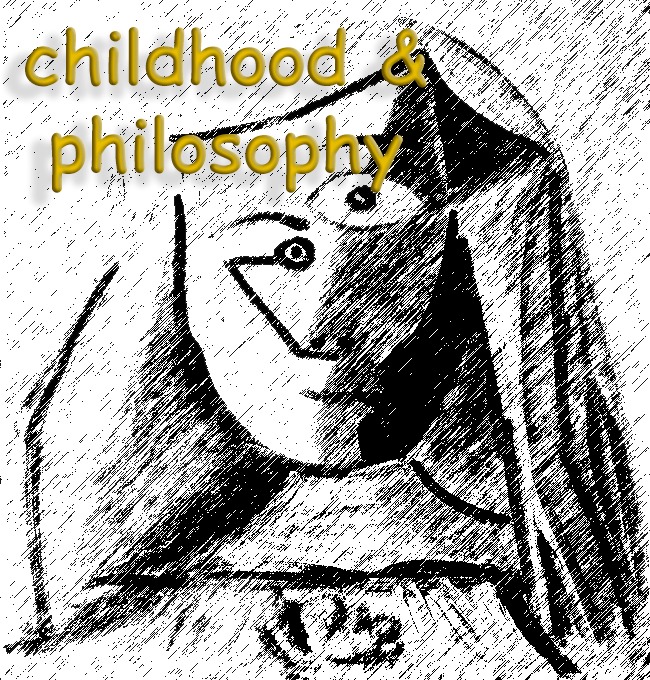childhood and the (un)speakable: ubuesco power, resistance, and the possibility of justice
DOI:
https://doi.org/10.12957/childphilo.2021.56126Keywords:
childhood, truth, resistence, kynismos, human rights, justice.Abstract
The article, as part of a broader reflection on the criticism of the right to development and its impact on the modes of legal and political subjectivation of children and adolescents, questions the child's condition as a subject without speech, or a speech conditioned to criteria of maturation, dictated by the adult referential, in a field, moreover, limited to what is said to be pertinent to their manifestation. Guided by the thought of exteriority, we return to the Foucauldian debate on the relation between truth and justice, in light of the monstrous unspeakability of legal and judicial practices and the ubuesco of state power. We will analyze, through the contributions of classic cynicism (kynismos), supported by Foucault, and Sloterdijk, Nieheus-Pröbsting, the resistant practices - beyond language – available to children and adolescents, and rethink these power struggles in the context of human rights and the possibility of justice, through the thought of Derrida, Rancière, Butler and Foucault. Our text will develop along the following axes of analysis: 1. Contextualizing the Foucaultian debate on truth and justice and the place of the “sayable”; 2. Considering the (in)sayability at the heart of law, childhood and monstrosity; 3. Framing the struggle between ubuesco power and cynic resistance, and 4. Speculating on our notions of “child” and the possibility of justice.
References
Agamben, Giorgio. Enfance et histoire. Paris: Payot, 2002.
Bobbio, Norberto. A era dos direitos. Rio de Janeiro, Campus, 1992a.
Bourdieu, Pierre. La représentation politique. Éléments pour une théorie du champ politique. Actes de la Recherche en Sciences Sociales. ano 1981,
Butler, Judith. Qué es la crítica? Un ensayo sobre la virtud en Foucault. Traducción de Marcelo Expósito e Joaquín Barriendos. 2001. Disponível em: http://eipcp.net/transversal/0806/butler/es. Acesso em: 15 out. 2019.
Butler, Judith. Notes toward a performative theory of assembly. Cambridge, Massachusetts: Harvard University Press, 2015
Cambiano, Giuseppe. Tornar-se homem. In: Vernant, Jean-Pierre. O homem grego. Lisboa: Editorial Presença, 1994.
Costa, Jurandir Freire. Ordem médica e norma familiar. 4. ed. Rio de Janeiro: Graal, 1999.
Deleuze, Gilles; Guattari, Félix. Mil platôs. São Paulo: Editora 34, 2017. v. 4.
Derrida, Jacques. Force de loi. Le ‘fondement mystique de l´autorité’. Paris: Galilée, 1994
Donzelot, Jacques. A polícia das famílias. 2. ed. Rio de Janeiro: Graal, 1986.
Ewald, François. L’État Providence. Paris: Éditions Grasset & Fasquelle, 1986. E-book
Fonseca, Márcio Alves da. Michel Foucault e o direito. São Paulo: Max Limonad, 2002.
Foucault, Michel. Dits et écrits (Ditos e escritos). Paris: Gallimard, 1994. 4 v.
Foucault, Michel. A verdade e as formas jurídicas. Rio de Janeiro: PUC-NAU, 1996.
Foucault, Michel. Le pouvoir psychiatrique. Paris: Gallimard, 2003.
Foucault, Michel. Segurança, território, população. São Paulo: Martins Fontes, 2008.
Foucault, Michel. A hermenêutica do sujeito. São Paulo: Martins Fontes, 2010.
Foucault, Michel. A coragem da verdade. São Paulo: Martins Fontes, 2011a.
Foucault, Michel. O governo de si e dos outros. São Paulo: Martins Fontes, 2011b.
Foucault, Michel. Os anormais. São Paulo: Martins Fontes, 2014.
Foucault, Michel. L’archéologie du pouvoir. Paris: Gallimard, 2015a
Foucault, Michel. Les mots et les choses. Une archéologie des sciences humaines. Paris: Gallimard, 2015b
Foucault, Michel. Naissance de la clinique. Paris: PUF, 2015c.
Gil, José. Monstros. Lisboa, Relógio d´água. 2006
Golder, Ben. Foucault and the politics of rights. Stanford: Stanford University Press, 2015.
Jay, Martin. Downcast eyes. The denigration of vision in twentieth-century French thought. Berkeley, University of California Press, 1993
Laertios, Diogenes. Vidas e doutrinas dos filósofos ilustres. 2. ed. Brasília, DF: UNB, 1987.
Lyotard, Jean-François. A condição pós-moderna. 5. ed. Rio de Janeiro: José Olympio, 1998.
Lyotard, Jean-François. Le postmoderne expliqué aux enfants. Paris: Galilée, 2005.
Lyotard, Jean-François. Lectures d’enfance. Paris: Galilée, 1991.
Melo, Eduardo Rezende. Direito ao desenvolvimento: arqueologia de um dispositivo na subjetivação de crianças e adolescentes. São Paulo: Intermeios, no prelo
Niehues-Pröbsting, Heinrich. Der Kynismus des Diogenes und der Begriff des Zynismus. 2ª edição, München, Suhrkamp Verlag, 2016
Nuzzo, Luciano. Il mostro di Foucault. Limite legge, eccedenza. Milano: Meltemi editore, 2018.
Rancière, Jacques. Au bords du politique. Paris: Gallimard, 2012.
Rancière, Jacques. Le maître ignorant. Cinq leçons sur l´émancipation intellectuelle. Paris: Fayard, 1987.
Sloterdikj, Peter. Crítica da razão cínica. 2. ed. São Paulo: Estação Liberdade, 2012.
Stüssi, Anna. Erinnerung an die Zufunft. Walter Benjamins “Berliner Kindheit um Neunzehnhundert”. Göttingen: Vandenhoeck & Ruprecht, 1977.




